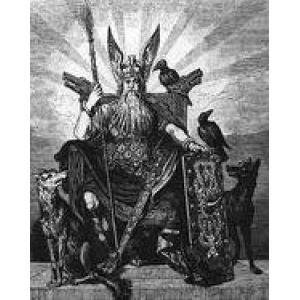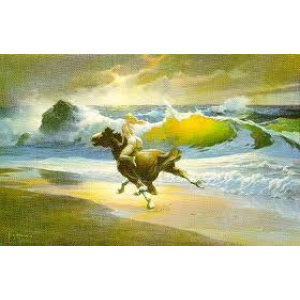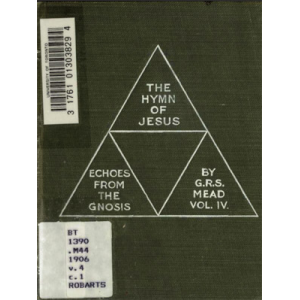Muses of Sicily, let's sing a nobler song,
For trees and humble tamarisks do not appeal to all.
If we sing about the woods, let them be worthy of a consul.
The final age the Sibyl told has come to pass;
The great cycle of the centuries is born anew.
The Virgin now comes back, and Saturn's reign returns;
A new first-born descends from heaven's height.
Look kindly, pure Lucina, on this boy whose birth
Will end the iron race at last, and raise a golden race
Throughout the world. Now your Apollo reigns.
And Pollio, in your consulship, this glorious age
Will dawn, and the mighty months begin their onward march.
With you to lead, all lingering traces of our sins
Will be erased, and free the earth from endless dread.
He will receive the life divine, see gods and heroes
Intermingle, and he himself be seen by them,
And through his father's goodness, rule a world at peace.
But first, child, the untilled earth will give you little
Gifts: wandering ivy with cyclamen everywhere,
Smiling acanthus mingling with Egyptian beans.
Goats will come home, their udders full of milk,
All by themselves; and cattle will not fear huge lions.
Your very cradle will shower you with caressing flowers.
The snake will die, and treacherous poison-plants
Will die, and Assyrian spice grow everywhere.
And then, as soon as you can read of famous men
And of your father's deeds, and know what manhood means,
Soft spikes of corn will slowly turn the fields to gold,
And reddening grapes will hang down from neglected briars,
And hardy oak-trees sweat with honeydew.
Yet lingering traces of our ancient sin
Will still make men attempt the sea in ships, encircle
Towns with walls, and cut deep furrows in the earth.
A second Tiphys then there'll be, a second Argo,
To carry chosen heroes. Even second wars there'll be,
And great Achilles will be sent once more to Troy.
Later, when strengthening years have made a man of you,
The merchant will forsake the sea, and pine-wood ships
Exchange their goods no more. All lands will grow all things.
Earth will not feel the hoe, nor vines the pruning-knife.
The sturdy ploughman now will free his oxen from the yoke.
Wool will not have to counterfeit its hue,
For in the fields, the ram will change the colour of his fleece,
From softly-glowing purple to a saffron gold;
And natural red will clothe the grazing lambs.
'Let centuries like these come soon', the Fates cried
To their spindles, in concord with the steadfast will of destiny.
Dear child of gods, great progeny of Jupiter,
Take up your gloriousness - the time will soon be here.
Look how the cosmos trembles in its vaulted mass,
The land, the ocean's reaches, and the unfathomable sky.
Look how they all rejoice in the age that is to be!
If then the final days of my long life remain
And I have breath to celebrate your deeds,
Then neither Linus nor Orpheus from Thrace will vanquish me
In song, however much one has his mother's, one his father's, help -
Orpheus Calliop"e's, and Linus fair Apollo's.
If even Pan should challenge me, with Arcady as judge,
Pan too, with Arcady as judge, would own defeat.
So come, then, little boy, and greet your mother with a smile
(She carried you for ten long, painful months).
So come, then, little boy. A child who has not smiled upon his mother,
No god thinks worthy of his table, nor goddess of her bed.
Also try this free pdf e-books:
Howard Phillips Lovecraft - CelephaisHoward Phillips Lovecraft - Cool Air
Tuesday Lobsang Rampa - Three Lives
Labels: unicorn stories lore asatru north 2000 chant heathen rites asked star works crowley myths superstitions poet queen aphrodite mother goose linear light tower wicca guide ove spells meditation chimes how to become a lucid dreamer





















